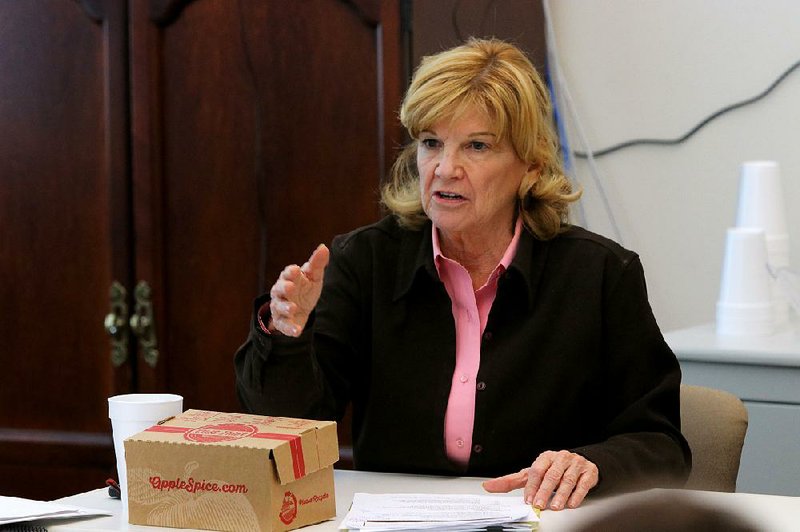Betty Guhman says she's stepping down as director of the state's Youth Services Division so she can focus on efforts intended to overhaul Arkansas' juvenile-justice system, according to a Tuesday news release.
Guhman, 68, plans to leave today after leading the division since July 2016. She'll go to the Department of Human Services' Office of Legislative and Intergovernmental Affairs until she retires next summer. Throughout her career, she has focused on issues affecting Arkansas children, as a social worker and then as a child-welfare policy adviser for Gov. Bill Clinton.
Michael Crump will replace Guhman on an interim basis. Crump heads the department's compliance and integrity unit and has worked in state government for nearly 15 years. He's also a former Pulaski County prosecutor.
Guhman's departure comes just weeks after she presented, alongside Gov. Asa Hutchinson, the division's "Transformation Plan," which lays out major changes to the state's juvenile-justice system, including the closure of two lockups no later than July.
"I want to use my remaining time at DHS to work with judges and the reform board to support efforts to reform the entire system," Guhman said in the release. "The state has been talking for years about transforming the system, and I think those changes are really happening."
The Human Services Department, which oversees the youth agency, will immediately begin a nationwide search for a permanent director to replace Guhman, said Keesa Smith, a department deputy director.
The department expects to post the job listing on the state's website today, said spokesman Marci Manley. The new director's salary depends on a candidate's experience and would begin at $108,110.
According to state records, Guhman earns $114,410 a year; Crump, $93,850.
In a prepared statement, Human Services Director Cindy Gillespie commended Crump on his experience "transforming the integrity and fraud efforts" within the department.
Gillespie also noted that Crump would keep the youth agency "on track as we continue to reach the milestones we've planned."
'COMMON PASSION'
Guhman was a new director two years ago when she said that juvenile justice in Arkansas was approaching a "huge turning point" and that the division played an integral role in change.
She inherited many problems, however, some of which remain. For instance, advocacy organizations continue to find that abuse and neglect occur at several youth jails across the state. In the past, federal investigators unearthed similar problems.
Guhman's role as director also became more complicated when the governor ordered that the state take control of the juvenile jails in December 2016. These lockups hold as many as 200 adjudicated youths.
Day-to-day operations of those facilities had been managed by two Arkansas nonprofits for years, but a new $160 million bid to run the sites was set to go to a private Indiana company, prompting protests by the state nonprofits.
When lawmakers failed to approve the new contract after those protests, Hutchinson sought to avoid "government shutdown" and pushed management of the facilities to the state instead.
Guhman and her staff then had to figure out what it took to run a lockup. Inspectors from Disability Rights Arkansas, a nonprofit with federal monitoring authority, found many issues remained after the state takeover, including inadequate behavioral-health treatment and poor facilities.
But youth advocates say they also saw progress under her leadership.
Children spent less time waiting to get into state-run treatment centers, meaning that the length of overall incarceration periods decreased.
Guhman created a new educational director position for her agency, and children at the facilities began using Virtual Arkansas, a state accredited online program, so the credits they earned behind bars would be accepted by schools back home.
She was a key participant in the state's Youth Justice Reform Board and promoted the use of formal assessments to determine the risk level of a child before sentencing to help keep low-risk children out of jail. She also advocated for funding and created innovation grants totaling $1.85 million annually that went to community programs for at-risk children and their families.
"I was honored to work with Director Guhman," said Faulkner County Circuit Judge Troy Braswell, who chairs the legislatively empowered reform board. "We share a common passion for helping at-risk youth... I remain confident that juvenile justice reform will not only continue, but that it will have a positive impact on the youth of our state."
'GOOD FIRST STEP'
Crump will lead the Youth Services Division as it attempts to carry out its "Transformation Plan."
The plan does more than close two youth facilities -- treatment centers in Colt and Dermott -- within half a year. It returns control of those facilities to a private operator and changes one site, the Harrisburg Juvenile Treatment Center, to an all-female facility.
The plan also will retool how children are sentenced and treated. For instance, funds that would normally be spent locking up children would go to therapeutic group homes, psychiatric and substance-abuse programs, community-based services or diversion efforts that direct children away from formal processing in the juvenile courts while still holding them accountable. The state spends more than $27 million a year on youth incarceration.
Adjudicated youths will be afforded more options, such as vocational training and opportunities, under the plan.
Additionally, new contracts will be issued for community-based providers who currently oversee certain youth services, including juvenile probation, after care or re-entry and mental-health treatment. The contracts will require more from these providers, including better family engagement, more field evaluations and better quality outcomes for youths.
Some changes included in the plan will require legislative review, but most can be completed through state agency procedures, Guhman has said.
Because of all these efforts, Smith said in the news release that the Human Services Department is looking for Guhman's replacement to have a "strong juvenile justice background" and "experience in operations and analytics to strengthen performance and measure outcomes."
Madelyn Keith, executive director of East Arkansas Youth Services, a community-based provider in Marion, said she had mixed feelings about the change in leadership. She and other providers plan to meet Crump soon so he can "hear our thoughts and ideas," she said.
Keith views the Youth Services Division plan as a "good first step towards reform," especially Guhman's effort to "redirect resources to community-based services and alternatives."
"There is always a certain amount of concern when we have a change in leadership," she said. "We are hopeful that having Ms. Guhman remain active in the reform efforts will help ensure that we stay on course and continue to move forward."
A Section on 12/05/2018

